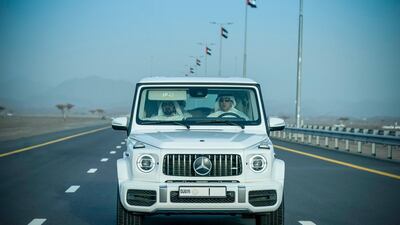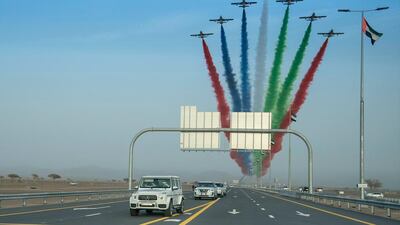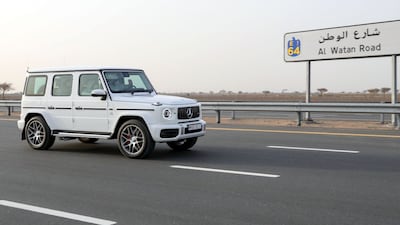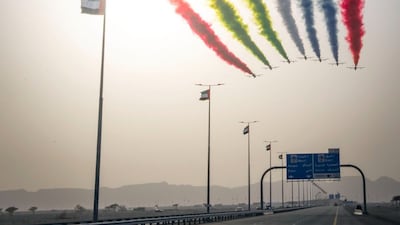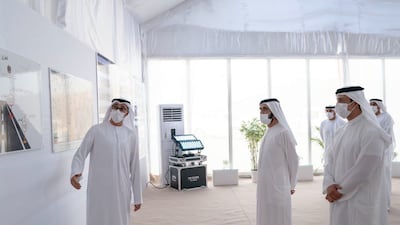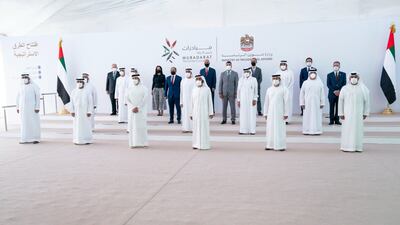The UAE has opened three major new roads that cut travel times, improve traffic flow and enhance safety at a cost of Dh1.9 billion.
They include a road linking Mleiha in Sharjah with Al Shuwaib in Abu Dhabi and another connecting Hatta in Dubai with Masfout in Ajman and on to Ras Al Khaimah.
Sheikh Mohammed bin Rashid, Prime Minister and Ruler of Dubai, announced the initiatives on Monday and toured the projects with Sheikh Mansour bin Zayed, Deputy Prime Minister and Minister of Presidential Affairs.
Planes from Al Forsan, the UAE Airforce’s aerobatic display team, soared overhead as they inspected the developments in Sheikh Mohammed's striking Mercedes G-wagen.
"Our mega projects aim to connect our cities and shorten distances across the country," said Sheikh Mohammed.
“[They also] aim to strengthen the country’s status as a global model for sustainable development and provide its people with a quality of life that rivals the world’s best."
Video posted to Sheikh Mohammed's social media showed the epic extent of the cross-emirate road networks that aim to cut journey times, improve safety and streamline the flow of vehicles on the road. Crews of workers can be seen adding lanes, and laying down new tarmac.
The first of the three is an extension of the E84 Sheikh Khalifa Road. It now runs from the intersection of the E84 with the E101 Sharjah to Kalba Road to the Mleiha area of Sharjah and ends at Abu Dhabi's Al Shuwaib. The 52-kilometre route has three lanes in each direction and is designed to handle speeds of up to 140km per hour.
The second is the E64 Al Watan Road, which connects Dubai's Hatta area to Masfout in Ajman before progressing to Wadi Al Qor in Ras Al Khaimah. It also connects to the first route in Mleiha. The 42km road will cut the distance between Al Madam roundabout in Sharjah and Hatta, while reducing travel time by half an hour.
And the third part of the project is the development of the Dubai to Hatta road. The 18km stretch around Sharjah's Al Madam now has three lanes in each direction rather than two. Several pedestrian bridges have also been built.
The projects were supervised by the Ministry of Presidential Affairs in co-operation with the Ministry of Energy and Infrastructure and the Etihad Water and Electricity company.
Sheikh Mansour said infrastructure projects were key to "opening new horizons for economic growth and development" and were a high priority for the UAE leadership.
"The country aims to create infrastructure that is among the world’s best and our strategic projects are designed to further enhance the UAE’s high global ranking in economic, social and quality of life indicators," said Sheikh Mansour.
Abu Dhabi infrastructure projects
Meanwhile, Abu Dhabi's Department of Municipal Affairs (DMT) said it completed more than 150 infrastructure projects in 2020. despite the challenges brought by Covid-19.
In a report listing the DMT's achievements and published by the Abu Dhabi Media Office on Monday, it said the projects were undertaken across the emirate in Abu Dhabi, Al Ain and Al Dhafra.
They included tunnels, streets, bridges and designated car parks, and also included the construction, development and rehabilitation of parks, development of pedestrian paths and bicycle paths. The work also included landscaping and adding greenery to public areas.
The authority also issued 8,900 construction permits in 2020 – an increase of 13 per cent on the previous year, while the volume of property transactions increased to Dh74bn, compared with Dh58bn in 2019.

Popular mode of transport
The report said the number of passengers who used taxis reached 56 million through about 31 million trips made by 6,390 taxis. There were also 42 million rides on buses, while the DMT in 2020 provided Wifi in 520 of the buses.
The numbers of ferry users reached 106,069, an increase of 17 per cent on 2019. In addition, 367 berths were developed in the emirate at a cost of Dh100m.
